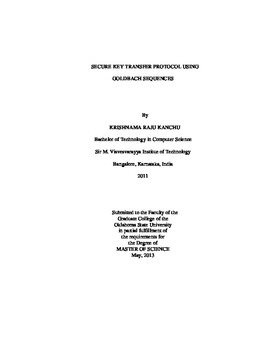| dc.contributor.advisor | Kak, Subhash C. | |
| dc.contributor.author | Kanchu, Krishnama Raju | |
| dc.date.accessioned | 2014-09-24T14:18:05Z | |
| dc.date.available | 2014-09-24T14:18:05Z | |
| dc.date.issued | 2013-05-01 | |
| dc.identifier.uri | https://hdl.handle.net/11244/11097 | |
| dc.description.abstract | Cryptography has been most successfully deployed in protocols where a client-server relationship exists, such as Secure Socket Layer(SSL) and Transport Layer security(TSL). A data can be encrypted using an encryption algorithm along with a public key. This encrypted data could be read by the node which has the private key of this encrypted data which can decrypt the message. A signature is formed together with a message digest and a private key. It makes it impossible to detect the message digest given a key and also it would be impossible to detect the key given a message digest. Other variations are given in [13],[14].In this thesis we consider a new way to develop a key distribution protocol using the standard Goldbach conjecture and its constrained forms. According to this conjecture any even number can be represented as a sum of two prime numbers. We have looked at random sequences obtained from the count of partitions of different even numbers and we have derived new variant sequences of this partition random sequence. Random sequences can be good candidates for cryptographic keys [15]-[18] and they have other applications in cryptography. When random sequences from different sources are used, their independence may be checked by a cross correlation analysis [19]-[21].Goldbach partitions will be shown to have excellent cross correlation properties. We also present the use of Goldbach partitions for a key exchange protocol. | |
| dc.format | application/pdf | |
| dc.language | en_US | |
| dc.publisher | Oklahoma State University | |
| dc.rights | Copyright is held by the author who has granted the Oklahoma State University Library the non-exclusive right to share this material in its institutional repository. Contact Digital Library Services at lib-dls@okstate.edu or 405-744-9161 for the permission policy on the use, reproduction or distribution of this material. | |
| dc.title | Secure Key Transfer Protocol Using Goldbach Sequences | |
| dc.type | text | |
| dc.contributor.committeeMember | Park, Nophill | |
| dc.contributor.committeeMember | Cline, David | |
| osu.filename | Kanchu_okstate_0664M_12681.pdf | |
| osu.accesstype | Open Access | |
| dc.description.department | Computer Science | |
| dc.type.genre | Thesis | |
